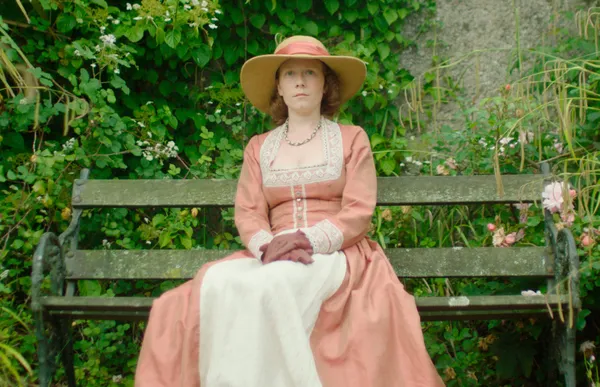 |
| Alexandra Loreth in The Yellow Wallpaper |
One of the standout films at this year’s Cinequest, Kevin Pontuti and Alexandra Loreth’s The Yellow Wallpaper is one of those low budget gems that risks being lost in obscurity when it really deserves a wide audience. Adapted from Charlotte Perkins Gilman’s famous short story, it tars Alexandra herself as Jane, a woman ill at ease with the domestic and maternal roles which late Victorian society has set aside for her, who is shut up in an isolated house by her doctor husband in the hope that this will effect a personality change. Unable to exercise her passion for writing, and without recourse to alternative forms of intellectual stimulation, she finds herself increasingly obsessed by the wallpaper in her room and imagines a female figure within it, hunched over and creeping along. When I met Kevin and Alexandra I asked them, first of all, how they went about finding the wallpaper itself.
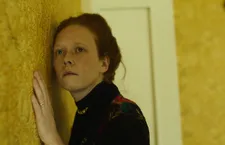 |
| The Yellow Wallpaper |
“We went through such an ordeal coming up with that,” says Kevin. “We went through so many designs. It's kind of a hybrid. We looked at all this William Morris and ended up modifying one. We printed it ourselves and installed it in this old convent in Ireland. We wanted to use like a mix of the floral pattern and then almost like a chain link kind of pattern that we can integrate underneath. It's kind of like, you know, making it a balance of the natural world and garden, but yet this kind of cage – that was some of the thinking around that.”
“And we printed out so many different samples,” adds Alexandra. “We tried it in so many different colours, and we would make it in the room to feel like the light was like on it throughout the day. It was kind of a fun process.”
There are some great effects achieved with it, just by shifting focus and letting the light hit it in different ways. How did they go about experimenting and finding out what was possible there?
“You know, it’s funny to m,” says Kevin. “We had Peter [Galante], our production designer from Wisconsin, he was shipping us samples that we would that hang up just in the bedroom, you know, and like, watch the light on two different days. And I remember one one day there was light coming in the window through the trees and kind of like creating that sort of effect and shadows, and so that that kind of got us thinking about it.
“We had a couple of months to live with the scripts in our house. But then when we got into Ireland our DP, Sonja [Tsypin], suddenly had all kinds of ideas about how to take how the natural light is and transform it. So much of the film takes place in that one room, you know? She was advocating the need to really be able to control the lighting and the shadows, so that it doesn't just feel the same all the time, so she came up with all these different ways to do these variations, like flooring or the shades and all the different tricks you use for the lighting.”
It's all the more important to get that right, I suggests, because it's such an internal film. Was that something that they worried about when they originally came to adapt it?
“Yeah,” says Alexandra. “I mean, that was probably one of our biggest worries, if not the biggest worry. And you know, the other thing is, with the film and the wallpaper, we actually didn't really do much. Like, we didn't really do any special effects in post production or editing. And that was something that we had talked about, whether or not we want to do the special effects with the wallpaper. I like the way that we did it – the natural, creative way – because it makes it seem so real. Like these are real things that you could actually be seeing in the wallpaper, you know?”
Was she always planning to star in it when she wrote the script?
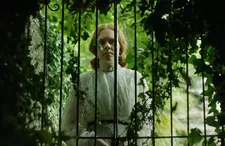 |
| Gates that lock |
“No!” she declares.
“That's 100% true,” says Kevin.
“He had always thought I was going to star in it,” she adds, with a nod in his direction. “I didn't really think that. I had to have this idea, and I guess in my mind I just was not picturing myself. And from the beginning he and our other partner, Peter, were picturing it. And then I think it really got to the point that I realised like, oh, we're not going to be able to afford a lead actress!” They both laugh as she continues. “I might be our only chance of getting this movie done. But once I got on board, I was really exciting to dedicate myself to that role. I think the main reason why I didn't picture myself in it in the beginning was because I was just scared of doing it. I've always loved the story. I felt like I didn't know if I could do this story. It’s emotional and so personal.”
I tell her that I really liked the way that you built up the physicality of the role, taking on the formation of the hunched and creeping figure which we hear about in the story. Kevin says that they had a lot of discussion about how to translate the creeping described in the story to the screen.
“Creeping translates, I think, into different things depending on who you're talking to,” he says.”Is that crawling is it, you know, this kind of creeping?” He hunches his shoulders and holds out both forearms with his hands bent, moving them up and down. “We had lots of discussions about just one word.”
“We first started on weather in the story,” says Alexandra. “We sat down and pretty much picked it over word by word. Another one was gates that lock, that was a big thing that we really focused on while we were reading, but creeping was probably like, the biggest word that we really focused on and thought of all the different meanings and all the different ways that we could show it, the different ways that I could do it. And then, you know, Kevin, and Sonja did such a good job with the directing and the cinematography that I feel like, they made it look really nice. Considering it wasn't, you know, fun to do.”
“There was a lot that we had kind of planned ahead of time, but then there was just a lot of stuff that happened, as we got used to our surroundings and our space,” adds Kevin. ”When we found the hedges in the garden that was like another image that we had thought of really early in the script writing and doing some drawings and stuff like that. We had a great location but then some of the things were definitely improvised and built as we were filming. We saw these other opportunities and had the gumption to go with them. Sonja and I found a lot of things visually that were really subtle, and some of them just came together during the editing, where we made these visual connections that weren't necessarily written initially in the script.”
The story is heavily focused on one character. How did they go about trying to make the husband at least a little bit sympathetic as well, so we understand something of his predicament?
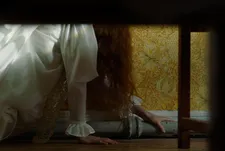 |
| Creeping |
“We had lots of talks about it,” says Kevin, “Like, does he care about his wife? Is he evil or really overbearing? And we tried to come up with something that was kind of in the middle where, you know, he was trapped in his time a bit and trapped in the circumstance and just became almost a little bit bumbling, in not necessarily even understanding the harm that he was doing. That’s one of the things, that we try to make him at least a little bit sympathetic.”
I ask Alexandra if she was concerned that her character’s fragile mental health might make it difficult for some viewers to connect with her.
“ I think, like, yes and no,” she says. “Part of me, from the beginning, thought that not only was she going to be relatable for this reason, but also I would be able to play her for the reason that, you know, one out of four people have dealt with mental illness in their life, and so that is technically a pretty relatable thing. But I was worried about the unreliable narrator and how that would come across and if people would, yeah, fully understand the character. And I think that was something that made me really nervous until I realised that was something that we could use to our advantage. And, you know, like, maybe it's a good thing if not every audience member understands, or Jane makes people uncomfortable. I think we're kind of okay with that.”
The other thing that might be a challenge for audiences if they don't know the story is how slowly it unfolds, which is really unavoidable if it’s going to be done justice.
“Yeah,” says Alexandra. “I mean, all of our films – we've done some short films and Kevin did a shorter feature before we started working together to direct features – all of them are very slow and have no or low dialogue. And so I think that's like a criticism that we've gotten before that we've become comfortable with. So we knew that there were going to be people that were unhappy with the way that this unfolded, but we're also turning a 17 page story into a feature length film, and we knew that there was really no way around that if we wanted to make the film the way that we wanted to make it. And yeah, I think we were okay with that, and knowing that it was going to be a slow film, and knowing that some people don't like that, but some people do. And hopefully the people that do like that will appreciate, you know, the way that we did it.”
Kevin nods. “I really was looking for this kind of build up, kind of a slow burn, then this kind of cacophony at the end. I think that from a rhythm standpoint, for me, at least, it kind of like lulls you in and it becomes this kind of contrast when the end hits. The last 15 minutes, you know, you're coming from such a quiet place that it allows you to go over the top a little easier, and in a way that we're so excited to see in the theatre one of these days. The theatrical experience was in, in our minds originally and that was what it was designed for. We were really thinking about the audience in the theatre and what they would walk out feeling like, that kind of visceral experience of cinema.
“Some of my favourite films are relatively slow and so I don't have a problem with that, but we tried to keep it under wraps and think about the audience. So it was what it needed to be. Being being locked up in a room is slow. It’s her experience. It just needed to be slow.”
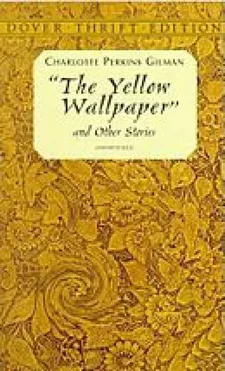 |
| The Yellow Wallpaper short story |
Did the process of making the film change the way that either of them felt about the story?
“I think one of the one of the things that we keep coming back to – we were talking about this this morning - is, you know, when you're adapting something, especially something with this gravitas, this kind of weight to it is real,” he says. “It's certainly not easy, and it's something that we thought really hard about in terms of, you know, there's no point trying to replicate it exactly. Especially given that it's a story that lives in writing. So we really tried to look at it and hope audiences will do that. We're kind of building off it in a way, or honouring it. But we had to do our own version of that and find a way to kind of add to the legacy of it, rather than trying to just do a literal interpretation of it.
“We had a lot of talk with one of my colleagues who teaches adaptation at the university. We had lots of conversations around, like, okay, we want to stick with the themes and some of the imagery and the characters but we're going to have to expand and switch it up and find our kind of version of that. So now thinking back to the original story. I haven't read it, I guess, in a in a few months. But now, without without thinking about it, there's all these things that I love about the story that aren't in the film because there's no way they could be All that time she describes the wallpaper and the patterns, all the things that she's seeing in it, you know, we had to find a way to do that visually, because there's no point her describing the wallpaper too much if we're showing it, right? I think we love the story just as much, if not more, and probably have even more respect for it, which is hard to imagine.”
“If anything, I find the story more tragic now after making the film than I did before,” says Alexandra. “And I don't know if that's just because of how much we looked into the story and really studied that for so long, or if it's because I played that character.”
I ask her if she thinks it also has a different resonance these days because people are used to having so many things grabbing their attention that just the experience of being alone in a quiet space is really unusual.
“Yeah, yeah. And I think that's one of the main reasons why we like slow films in general. I'm the type of person that I have a really hard time sitting through any movie, but especially slow movies. So it's almost like a meditation for me to be able to sit through a long, slow, quiet movie. That's where a lot of enjoyment for me comes from. I understand why it's hard for some people to get through at all, because I do feel that sometimes, but it was also a fun challenge.”
So what are their hopes for the film now?
“We definitely are excited to get it out there,” says Kevin. “Cinequest was a great venue for our career. It's pretty close to where we live so normally we might have been there. It's maybe an hour and a half, from here. They've been great in terms of getting helping us get the word out. We're looking for some international opportunities. We are definitely looking to get it out and to some other festivals, and possibly into an educational tie in sort of run in the Fall with some universities, we've had some interest. And then, you know, distribution and getting it out there. We'd love to love to get it into some theatres, and then, you know, using it to add to the dialogue and the discussion around these issues. We hope that it generates awareness.
“It is an interesting thing to be releasing it in a pandemic when everybody's been locked up, so we’re hoping that that adds some kind of meaning additional meaning to it for people kind of coming out of this.”
























